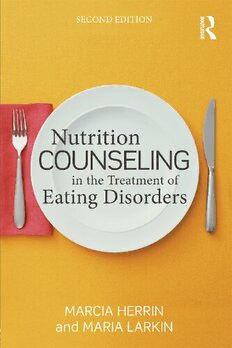
Nutrition Counseling in the Treatment of Eating Disorders PDF
Preview Nutrition Counseling in the Treatment of Eating Disorders
NUTRITION COUNSELING IN THE TREATMENT OF EATING DISORDERS Marcia Herrin and Maria Larkin have collaborated on the second edition of Nutrition Counseling in the Treatment of Eating Disorders, infusing research-based approaches and their own clinically-refined tools for managing food and weight- related issues. New to this edition is a section on nutrition counseling interven- tions derived from cognitive-behavioral therapy-enhanced dialectical behavio- ral therapy, family-based treatment, and motivational interviewing techniques. Readers will appreciate the state of the art nutrition and weight assessment guide- lines, the practical clinical techniques for managing bingeing, purging, excessive exercise, and weight restoration, as well as the unique food planning approach developed by the authors. As a comprehensive overview of food- and weight- related treatments, this book is an indispensible resource for nutrition counselors, psychotherapists, psychiatrists, physicians, and primary care providers. Marcia Herrin, EdD, MPH, RD, LD, is the founder of Dartmouth College’s eating disorders program. She has worked in the area of eating disorders since 1987 and is co-author of The Parent’s Guide to Eating Disorders. Dr Herrin is a fre- quent presenter at conferences and offers supervision for other professionals. She has a private practice in Lebanon, New Hampshire. Maria Larkin, MEd, RD, LD, is head of nutrition counseling at the University of New Hampshire and also has a private practice in Durham, New Hampshire. Larkin has a master’s degree in counseling with a specialization in eating disorders. As a writer and workshop presenter, she has worked in the field of nutrition for over 30 years and specialized in eating disorders for over 10 years. NUTRITION COUNSELING IN THE TREATMENT OF EATING DISORDERS Second Edition MARCIA HERRIN AND MARIA LARKIN First published 2013 by Routledge 711 Third Avenue, New York, NY 10017 Simultaneously published in the UK by Routledge 27 Church Road, Hove, East Sussex BN3 2FA Routledge is an imprint of the Taylor & Francis Group, an informa business © 2013 Taylor & Francis The rights of Marcia Herrin and Maria Larkin to be identified as authors of this work have been asserted by them in accordance with sections 77 and 78 of the Copyright, Designs and Patents Act 1988. All rights reserved. No part of this book may be reprinted or reproduced or utilised in any form or by any electronic, mechanical, or other means, now known or hereafter invented, including photocopying and recording, or in any information storage or retrieval system, without permission in writing from the publishers. Trademark notice: Product or corporate names may be trademarks or registered trademarks, and are used only for identification and explanation without intent to infringe. Library of Congress Cataloging in Publication Data Herrin, Marcia. Nutrition counseling in the treatment of eating disorders / Marcia Herrin & Maria Larkin.–2nd ed.p. cm. Includes bibliographical references and index. 1. Eating disorders–Patients–Counseling of. 2. Eating disorders–Treatment. 3. Eating disorders–Diet therapy. 4. Nutrition. I. Larkin, Maria. II. Title. RC552.E18H47 2012616.85'2606–dc23 2012020237 ISBN: 978–0–415–87103–7 (hbk) ISBN: 978–0-415–64257–6 (pbk) ISBN: 978–0–203–87060–0 (ebk) Typeset in Bembo by Swales & Willis Ltd, Exeter, Devon To my grandmother, Catherine Giudici Burke, in loving memory. Marcia Herrin To my father, Giovanni Salvatore Miccio, for believing in me. Maria Larkin CONTENTS Preface ix PART I Nutrition Counseling 1 1 Clinical Features of Eating Disorders 3 2 Course of Treatment 32 3 The Process of Counseling 59 4 Counseling Interventions 79 PART II Tools 105 5 Food Planning: Rule of Threes 107 6 Self-Monitoring 140 7 Levels of Care 150 PART III Treatment 167 8 Assessing Weight 169 viii Contents 9 Restoring Weight 191 10 Treating Binge Eating 229 11 Managing Purging 246 12 Managing Exercise 260 13 Working with Families 277 Appendix A: Introduction Packet 299 Appendix B: Checklist for Nutrition Assessment of Eating Disorders 304 References 311 Index 337 PREFACE We recognize the world is a changing place. Indeed, there are few constants in life. This truth has permeated our experience over the last two and a half years as we have laboriously researched and written this book. As our book underwent a transformation from the first edition to this new second edition, as new refer- ences replaced the old, and as chapters were renamed, reorganized and updated, we simultaneously observed many developments in the field of nutrition and eat- ing disorders. In the last few months, the American Dietetic Association (ADA) changed its name to the Academy of Nutrition and Dietetics (AND) and produced its first position statement on and standards of practice for the treatment of eating disorders. Recently, the American Psychiatric Association (APA) proposed the DSM-5, new revisions to the DSM-IV diagnostic criteria for eating disorders. We even hesitate to say our book is finished, as research in the field of eating disorders is emerging by leaps and bounds. Two days before our book deadline, while opening her mail, Larkin found in the Journal of the Academy of Nutrition and Dietetics (formerly the Journal of the American Dietetic Association), a new research study and shared it with Herrin over the phone. The next day Herrin applied the research information in a counseling session with a patient. This example of applied research is just one of many that occurred during the course of our researching and writing of this book. In fact, we feel the strength of our book lies in our research-based recommendations and in our successful application of information that has, time after time, improved outcomes for our patients. As a result of writing this book, we have become more skilled and knowledgeable about nutrition counseling in the treatment of eating disorders. Yet, we still con- sider ourselves students—less “green” than before (Larkin’s masters program used the first edition as a text)—and still learning from our patients, colleagues, and researchers in the field.
